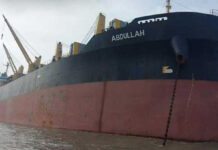Described by the London based respected newspaper Economist in particular as “electoral farce in Bangladesh” and the media in general in the West as dubious polls, the so-called democratic regime now in place after the outlandish selection/election caricature, the whole affair has been and will remain a highly contentious event at which conversant apolitical people are aghast, while even unlettered people across the country guffaw and snigger at the wretchedness of the Awami League (AL) established by its founding father Moulana Abdul Hamid Khan Bhashani 65 years ago with the unwavering pledge to institute unadulterated democracy of the people, whom the great leader had mobilised in a manner that smashed the Muslim League (ML) like a house of cards. The AL won 1954 general election —- conducted under the then ML government—- participated by some 90 per cent voters bagging about 78 per cent votes while the ML was inconsolably routed.
There is a single exception —- India —- which mollycoddles Sheikh Hasina and her party, much to the chagrin of major Indian newspapers like the Hindu, the Telegraph et al.
In the article published ahead of the polls, Electoral farce in Bangladesh: The minus-one solution, the Economist reported how Dhaka’s street number 79 in Gulshan was a “good place for a glance at the state of Bangladesh’s democracy. Here two sides of a house are blocked off by five lorries loaded with sand, and scores of policemen; a third side is blocked by the high walls of the Russian embassy. Khaleda Zia, the leader of Bangladesh’s main opposition party, is living under house arrest. Her followers who have tried to visit have been arrested, detained or turned away.”
Nevertheless, the first session of the parliament has begun and the honourable president Mr. Abdul Hamid in his speech requested the political parties that had boycotted the national elections to help build a consensus. Here it is very much pertinent that the Head of State was unfortunately in no mood to resolve the crisis when the Leader of the Opposition in Parliament sought her good offices personally. Indisputably the initiative of the Opposition leader and BNP chairperson Khaleda Zia seeking the president’s mediation to begin a dialogue at the general secretary level of the opposition and the ruling parties to resolve the political standoff was praiseworthy as it clearly indicated her earnestness for stability, peace and tranquillity. As the nation’s guardian the President could certainly play a momentous historic role to exercise his moral influence to bring the two parties at the talking table to settle the serious crisis caused due to the nature of the poll-time government.
Notwithstanding the fact that recent reliable opinion survey results invariably shown that the overwhelming majority of the people wanted the parliamentary elections to be held under a neutral caretaker government to ensure rigging-free credible polls participated by all parties —- but the intransigence of Prime Minister Sheikh Hasina pushed the ill-fated nation on a razor’s edge, violence followed and killings by law enforcers ensued.
In the last five years law and order situation was horrific and governance was simply bad in various sectors. Feelings of the body politic are running high concerning blatant violations of the rule of law, abject law and order situation characterised by extrajudicial killings by law enforcers, custodial deaths in police stations, scams and corruption [apropos Padma Bridge, Hallmark, Stock market scam, Destiny scam et al of Himalayan proportions,] murder of journalist couple Sagar and Runi and murder of Biswajit Saha in broad daylight by boys of the BCL the student front of the AL, as well as enforced disappearances of opposition political leaders and activists.
The other day the New York-based Human Rights Watch (HRW) has said the Bangladesh government should authorise an independent investigation into a recent spate of alleged extrajudicial killings by security forces. In a statement on Monday, the HRW said the government should publicly order law enforcement agencies to ensure the safety of all those taken into custody. It said joint forces continued to arrest opposition supporters, some of whom were accused of involvement in violent protests before and during the January 5 elections which were boycotted by opposition parties. Security forces claimed that the deaths after arrest had occurred in ‘crossfire’, which, the HRW had previously documented, was used by security forces as a common euphemism to describe what they claimed to be shootouts, but which in reality appeared to be the killing of people already in detention.
‘We are seeing a frightening pattern of supposed “crossfire” killings of opposition members in Bangladesh,’ said Brad Adams, Asia director of HRW. He urged the government to publicly order the security forces to follow the United Nations Basic Principles on the Use of Force and Firearms by Law Enforcement Officials, which stated that security forces “shall apply non-violent means before resorting to the use of force and firearms.”
We endorse Adams’ view: The Bangladesh government needs to ensure proper control of the security forces and order an independent and credible investigation into these deaths.
Source: Weekly Holiday









